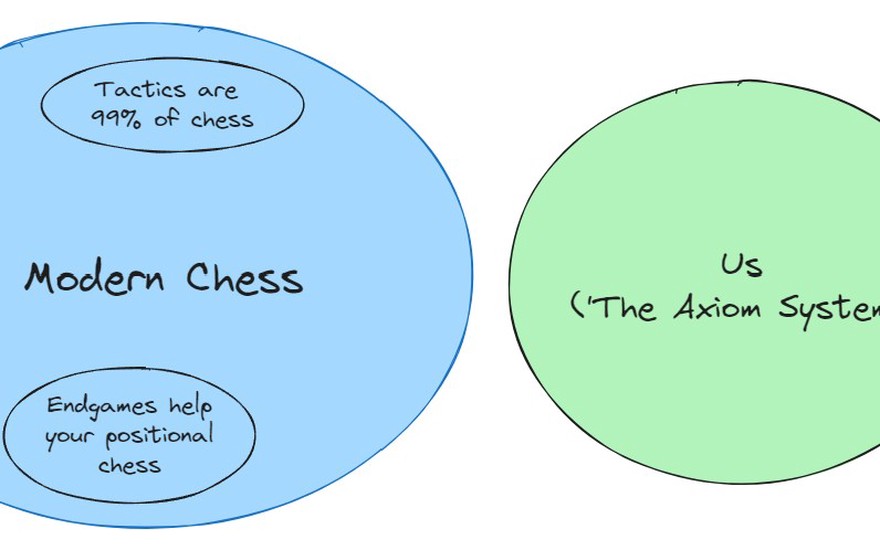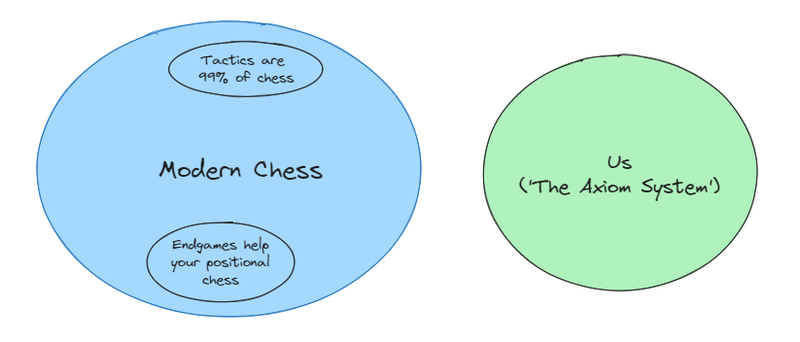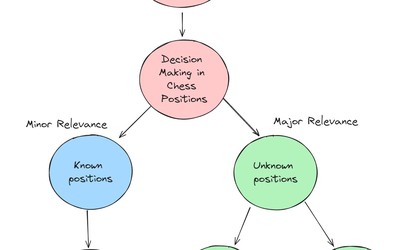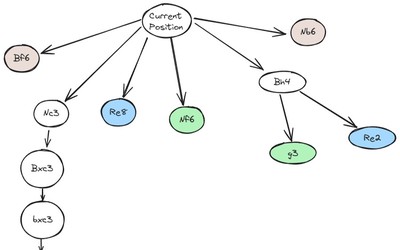
The Axiom System - Part 2: Typical Arguments in Chess
In my previous article in this series, I highlighted that many of the answers provided by modern chess culture, while appearing sage and wise, are often surprisingly shallow.I also stated that to better understand how we can improve as chess players, we need to develop a more robust and comprehensive understanding of practical chess.
In this article, I will expand upon the first point, demonstrating why it is simply better for us to start our journey of understanding practical chess from the ground up.
This article is also available on my personal website.
Do We Have Any Hope?
To begin, let’s start with considering how we might even attempt to answer the question of chess improvement. In other words, can we even hope to answer the question “How can one improve at chess?”.
In other domains, such as sports performance, substantial funding supports scientific studies that provide data-driven insights into improvement techniques. This empirical approach allows for systematic experimentation and analysis.
However, in chess, such funding is scarce or even non-existent, making it difficult to apply the scientific method in our field. I assume most readers are familiar with the general principles of the scientific method and how it can be applied to acquire knowledge.
Fortunately, we have another tool at our disposal: reasoning.
Brief Introduction to Reasoning
For our purposes, reasoning involves starting with basic principles – axioms – that we accept as true, and using logical processes to derive new, useful insights – conclusions. These conclusions should ideally reveal something non-obvious, and the axioms should be as obvious and self-evident as possible to ensure clarity and reliability.
I should mention here that even if the chess world were to receive more funding for empirical research, a solid theoretical and reasoning-based framework would still be necessary. Such a framework is essential for formulating meaningful and ‘worthy’ hypotheses that can be empirically tested. Without a reasoned understanding of the principles underlying chess, any empirical research might lack direction and relevance. In other words, implementing reasoning when constructing our system of practical chess will be important in any case.
To assist in understanding a line of reasoning, arguments are often structured by laying out the axioms (also known as premises or assumptions) followed by the conclusions drawn from these axioms. Consider the following example:
- Axiom 1: If it is sunny, then we will play.
- Axiom 2: It is sunny.
- Conclusion: Therefore, we will play.
If we accept Axioms 1 and 2 as true, the conclusion logically follows, making this a valid argument. However, consider another example:
- Axiom 1: All birds can fly.
- Axiom 2: Penguins are birds.
- Conclusion: Therefore, penguins can fly.
This argument is structurally valid, meaning if the premises are true, the conclusion must be true. Yet, it is unsound because Axiom 1 is incorrect – not all birds can fly – leading to a false conclusion.
Having established that empirical methods are limited in chess, we now understand that we are compelled to rely on reasoning to deduce truths about improving in chess. We've then explored what reasoning entails: starting from basic, self-evident axioms and logically deriving conclusions that extend our understanding of the game.
Now that we've grasped the mechanics of reasoning, let’s apply this framework to explore typical arguments you might encounter in the chess world.
Typical Arguments in Chess
Considering the limited empirical evidence at hand and the need to depend on reasoning, we'll explore what the current chess community might suggest as an answer to the question of improvement.
One frequent piece of advice is to ”Study the classics.'' To clarify, 'the classics' refers to historic chess games - often played by famous players - that have remained influential and celebrated over time. This is often the end of the discussion, but if you try and push further, then you may find an underlying argument as follows:
- Axiom 1: If you study the classics, then you will improve your understanding of chess.
- Axiom 2: If you improve your understanding of chess, then you will improve at chess.
- Conclusion: Therefore, if you study the classics, then you will improve at chess.
Looks fair enough. It seems reasonable at first to suggest that improving your understanding of chess can help you improve your play. However, if you delve into what 'understanding of chess' really entails, and how it supposedly aids in improving your play (that is, how it helps you make better moves or informs your decision-making at the board), the argument begins to fall apart.
This issue isn't isolated; it's a recurring theme in the typical answers provided by modern chess culture. On closer examination, many explanations rest on vague and poorly defined concepts that the chess community has uncritically accepted. Moreover, when we examine these concepts more closely, we often find they don't reflect the way that chess is actually played, and how decisions are actually made during a game (we will be expanding upon this later in part 4 of this series).
In other words, while the above argument itself is structurally valid, it is not sound because its premises are not universally true (I won’t be arguing why I believe this quite yet - we will be speaking more about this idea of ‘understanding’ when we discuss justification in chess in article 4).
Again, the above is simply an example. I know that not everyone involved in the chess world would agree with the above argument. In fact, many would disagree with it. I’m very much aware that the beliefs within the chess world are quite diverse.
Rather, the purpose of the previous example is to highlight a broader issue: the reasoning often employed in the chess world is based on vague, poorly defined concepts. Furthermore, when we try to push further and get to the heart of what is actually being said, we often find that nothing much is being said at all.
This observation might help explain why the landscape of beliefs within the chess world is so heterogeneous. Chess players often hold scattered, individual beliefs shaped more by personal anecdotes and transient instincts than by clear, consistent reasoning. This lack of consensus and clarity contributes to the diverse and sometimes contradictory views prevalent in the community.
Again, I want to stress that this is a general observation and not a direct criticism of individuals who use the term 'chess understanding', or similar, in their discussions. Rather, I believe that such arguments, like any others, must be evaluated within their specific contexts. What I would ask for, though, is a more detailed explanation and analysis of what 'understanding' – or any concept being referenced – actually involves, as the understanding behind such concepts is often quite shallow.
On this point, when I published my YouTube video on improving tactics, I decided to take a rather thorough approach: I began by defining tactics, followed by stating my initial assumptions, considering potential rebuttals and so on. I made the video like this merely because I generally prefer to do so, even with the understanding that such level of detail would likely inhibit the success of the video on a platform such as YouTube, where viewer retention is crucial.
However, to my surprise, many viewers seemingly appreciated my approach. This indicated to me a strong desire within the wider chess community for a more systematic and justified approach to understanding chess improvement that goes beyond superficial advice.
But I digress. While this speculation is personally intriguing, it is not our core focus right now.
Instead, what matters for our discussion is recognizing that even though we rely primarily on reasoning to deduce how to improve in chess, the foundational axioms we use are frequently murky and not well-considered.
In summary, since chess players are restricted largely to reasoning due to the scarcity of empirical research, it is crucial that we scrutinize the foundations upon which our reasoning processes are built. Often, we find that these foundational beliefs are conceptually unclear and inadequately thought out, which can lead to unreliable conclusions about how to truly improve at chess.
In the next section, I will discuss what implications such general conceptual murkiness in the world of chess has for our mission to devise a practical understanding of the game.
Re-evaluating Chess Concepts
In the previous section, I mentioned this word, 'understanding'. If you've been playing chess for some time, then you no doubt would have heard this concept thrown around before:
- His positional understanding is not so good
- I need to improve my understand of these positions
- Her understanding of these endgame nuances is fantastic
This is just one concept of many that are popular and well-known in the world of chess. You may have also heard of other concepts such as grinding, outplaying and style to list some more. There are likely hundreds of such examples that make up the modern chess player's vocabulary. I will refer to this collection of concepts, along with the typical beliefs that depend on them, as 'modern chess culture.'
Modern chess culture is an amalgam of the concepts, theories, and practices that have been developed, shared, and evolved among chess enthusiasts and professionals. It's not just the vocabulary but also the general underlying ideas, approaches to game analysis and training methods (As mentioned earlier, I am aware that these are not homogeneous, hence `general').
Returning to our question about selecting the foundational axioms for our subsequent discussions, in the previous section I have suggested that many familiar chess concepts are not well-defined. Therefore, it seems illogical to construct our framework of understanding based on many of these unclear concepts.
For example, you may have had an experience before where you return to an old project of some sort, or maybe someone hands it off to you (for example, some coding project). Nothing is organized, no guiding notes are present to help you understand everything once again, and it's at this point that you realize it might be better to just start over again from scratch. This is how I feel about answering our question of chess improvement. Modern chess culture has kindly given us this collection of prior knowledge and vocabulary, which is mostly just unnecessary baggage.
Therefore, my approach will be to build my arguments from the ground up. This entails not taking for granted the commonly accepted terms such as understanding, technique, style or even tactics, openings and endgames. However, I might occasionally use these terms for ease of illustrating an example. I may also find them useful enough to reintroduce some of them into our 'world' of argumentation (for example, concepts of the opening and theoretical endgames will almost certainly be reintroduced).
Before we start attempting to form our framework for understanding practical chess, let’s first examine the pragmatic nature of chess to see why we are even ‘allowed’ to start our practical understanding of chess from scratch.
Pragmatism and Chess
Chess, like many games, is fundamentally a pragmatist's endeavour. In this context, being a pragmatist means that there isn't an absolute truth dictating how we should think about the game. Instead, we can adopt any conceptual framework that helps achieve the ultimate goal: checkmating the opponent.
Do concepts like 'doubled pawns' or 'weak squares' inherently exist? Are they 'real'? From a practical standpoint, these questions are irrelevant. Such concepts are merely tools – means to an end. We can choose to adopt them to make better moves or to train more efficiently if we wish.
Given this, I don't necessarily need to critique modern chess culture directly. Instead, I can propose an alternative conceptualization of chess and argue that it might be more effective in improving one’s rating. This is precisely what I intend to do.
By rejecting many axioms of modern chess culture and formulating my own, I'm establishing a distinct argumentative space. In this space, I am not bound by traditional assumptions and can therefore avoid acknowledging them directly.

Despite this, I think I owe the reader justifications for my negative tone with respect to modern chess culture. Therefore, although not necessary, I will be 're-entering' the world of modern chess culture throughout this work, and occasionally using our new theories and observations to argue against some of its suppositions.
In summary, I am indeed 'starting from scratch' to outline a new framework for understanding practical chess. Along the way, I will use observations to critically engage with and argue against some of the long standing beliefs of modern chess.
Next, we face an important question – how should we decide on the axioms for our new system? In the following section, we will explore how we might begin to craft a unique system for understanding practical chess.
Where to Start?
So, if we are to discard axioms that are, for example, of the form:
- Tactics are important
- Strategic play is more important than positional play
- Improving your understanding of the endgame will teach you about positional chess
Where do we begin? How can we establish new axioms that we can trust if we've set aside what seems to be the entirety of chess terminology?
The starting point is the most concrete thing we have when it comes to practical chess — the actual experience of playing chess.
From the direct, tangible experiences at the chessboard, we can derive observations and principles that are rooted in the reality of the game. This hands-on experience is our guide to formulating a solid foundation for understanding practical chess.
We will use this as our starting point, and state our initial axioms, in the next article in this series.
Part 3 is now available here.
P. S. Daily Chess Challenge
Improvement in Chess requires consistent, active training. That’s why I created Daily Chess Challenge, where you receive high quality chess training material in your inbox every day to help you improve. It’s completely free and all you need to do is input your email address. You can sign up in 2 seconds here.
More blog posts by DailyInsanity

Cheating: Trust and Traitors in Chess
How can we simultaneously tackle the two heads of the cheating beast — detection and trust?
The Axiom System - Part 3: How Do We Make Decisions
In the previous article, I explored the idea of starting from scratch to develop a framework for und…
